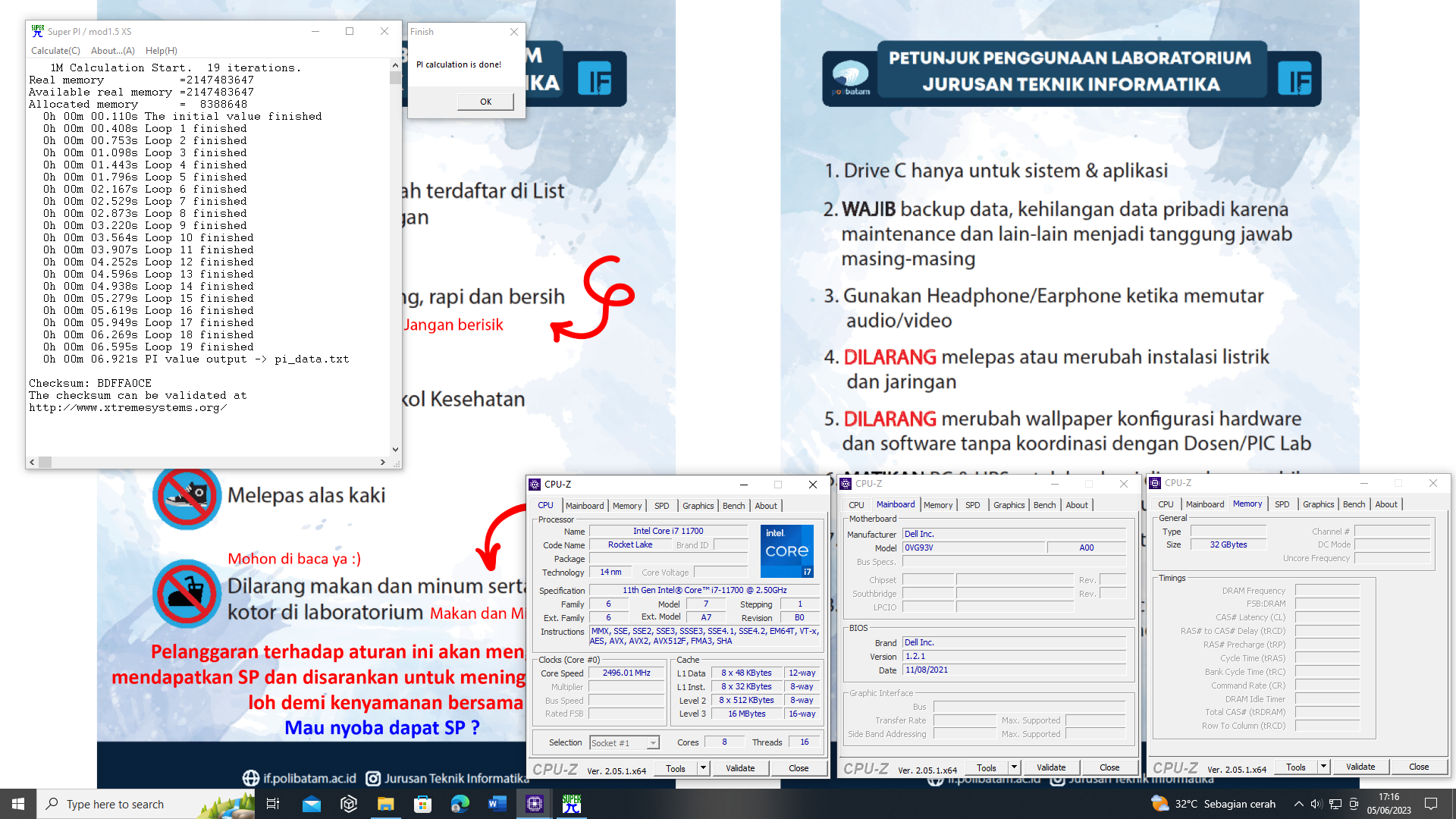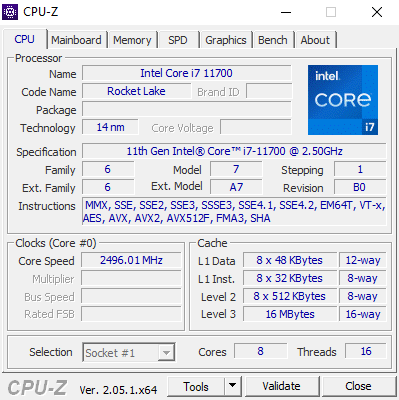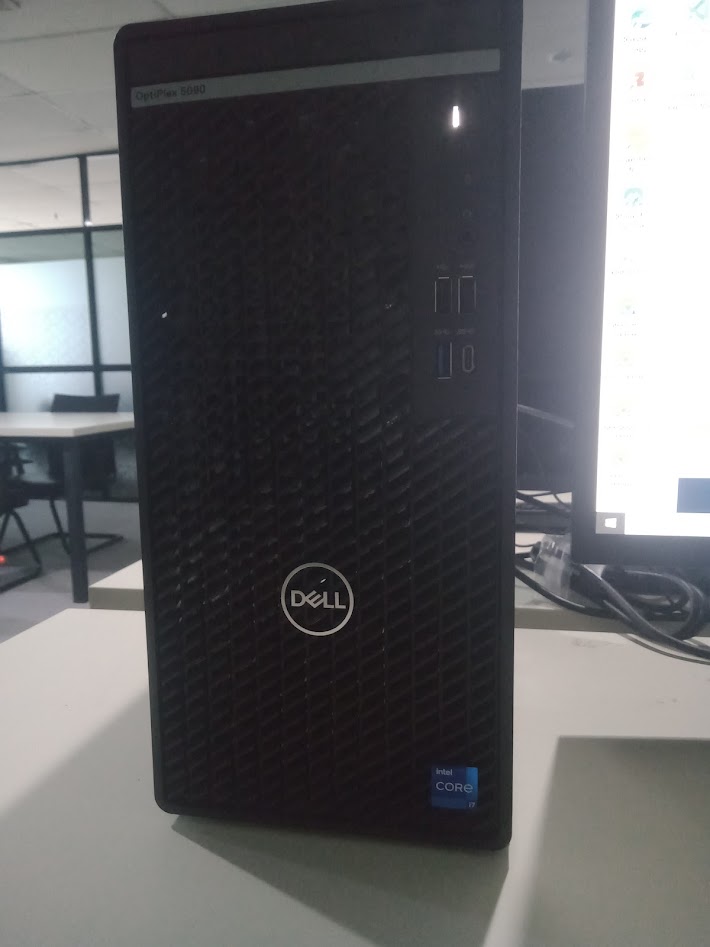SuperPi - 1M score 6sec 921ms with a i7-11700
Tuesday, 06 June 2023 03:05 | Update at 2 years ago
Media Gallery
Screenshot

Device, Setup, etc


URL
https://hwbot.org/submission/5289180-
Information Detail
Hardware: Intel Core i7 11700
Specs:CPUID : 11th Gen Intel(R) Core(TM) i7-11700 @ 2.5GHz
Architecture : x86
Codename : Rocket Lake
L3 Cache : 16 MB
Clock : 2.5GHz - 4.9GHz
Core/Thread : 8/16
TDP : 65W
Technology : 14nm
Socket : LGA1200
IGPU : Intel UHD Graphics 750
See more specification...
Software: SuperPi - 1M
Score: 6sec 921ms
About: SuperPi - 1MSuperPi - 1M is one of the classic and popular benchmarks used to measure single-thread CPU performance by calculating the number π (pi) to 1 million decimal places. This benchmark has long been a favorite benchmark among tech enthusiasts, overclockers, and hardware testers due to its simplicity, speed, and accuracy in directly assessing processor performance.
In SuperPi 1M testing, only one CPU core is used to complete the calculation as quickly as possible. This makes it ideal for assessing the single-core capability of a CPU, especially in scenarios where single-core performance remains highly relevant, such as in lightweight applications, gaming, or everyday use.
Despite its simplicity, SuperPi 1M is highly sensitive to clock speed, memory latency, and processor architecture efficiency. As a result, this benchmark is often used as a standard in overclocking competitions, as even small differences in system configuration can lead to significantly different execution times.
Features and Advantages:
- Calculates 1 million digits of the number π (pi) with precision.
- Emphasizes the single-thread performance of the processor.
- Runs quickly, ideal for repeated testing.
- Suitable for comparing CPU architecture efficiency.
- Still widely used in the global overclocking community.
Despite the availability of many modern benchmarks, SuperPi 1M remains a significant tool in CPU testing due to its direct representation of basic computational performance. This benchmark is also lightweight and compatible with nearly all Windows versions, making it a practical tool for quick system evaluation.
The Intel Core i7-11700 is a powerful desktop processor released in Q1 2021, as part of Intel’s 11th Generation Rocket Lake family. Designed for enthusiasts, gamers, and content creators, this CPU offers a solid balance of single-threaded and multi-threaded performance. It features 8 physical cores and 16 threads, making it ideal for tasks such as gaming, streaming, 4K video editing, 3D rendering, and heavy multitasking.
With a base clock speed of 2.5 GHz and a maximum turbo frequency of up to 4.9 GHz, the i7-11700 delivers strong performance out of the box. The processor is built on Intel’s 14nm process node, but with significant architectural improvements over the previous generation, notably higher IPC (Instructions Per Cycle) thanks to the Cypress Cove core design. Despite using the older 14nm process, these architectural upgrades allow the i7-11700 to compete closely with AMD's Ryzen 7 5000-series CPUs in many workloads.
The TDP (Thermal Design Power) of the Core i7-11700 is rated at 65W, making it relatively efficient for a high-end CPU. However, under sustained heavy loads, especially in systems with aggressive power limits or PL1/PL2 settings, actual power consumption can be much higher—so a decent cooling solution is recommended for consistent performance.
For integrated graphics, the i7-11700 is equipped with Intel UHD Graphics 750, based on the Xe architecture. It supports up to 4K resolution at 60Hz, HEVC/VP9 decode/encode, and can handle light gaming or display output without the need for a discrete GPU. Still, for users focused on gaming or GPU-accelerated workloads, pairing this processor with a dedicated graphics card is highly recommended.
Hardware Detail:
Device: Dell OptiPlex 5090
CPU: i7-11700
RAM: 32GB
OS: Windows 10
* Not Avaiable
